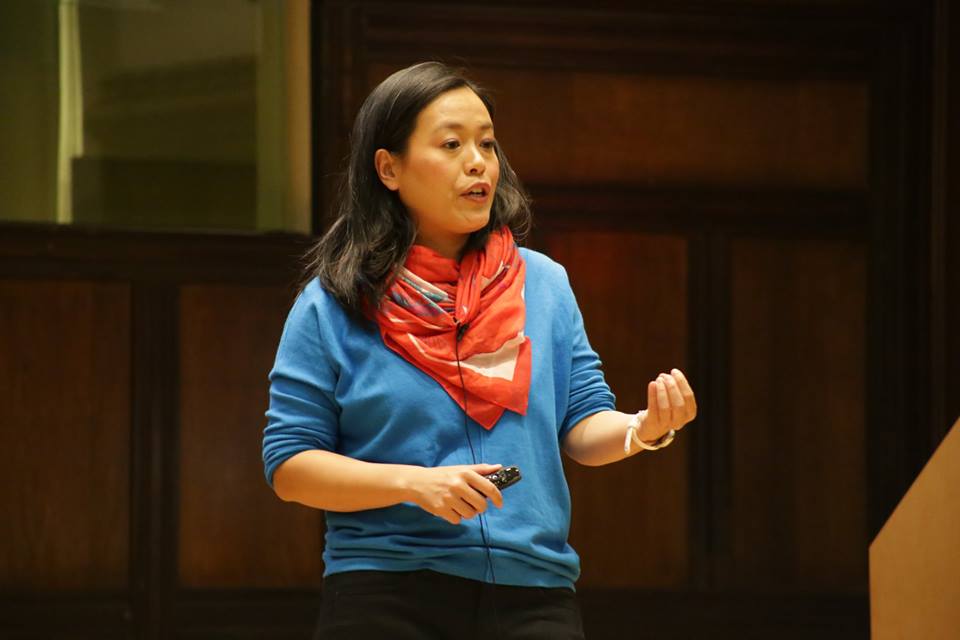
Due Quach talks to students at the Calm Clarity workshop. (Photo: Pan-Asian American Community House (PAACH))
“If it wasn’t for you, I don’t think I could do this.”
These were the words of a tearful Penn sophomore to Due Quach WG06 (pronounced Zway Kwok) at the Calm Clarity Intercollegiate Workshop on October 22, a free dinnertime event created by Quach to help first-generation and low-income college students develop leadership skills and build a supportive community. The young woman described her first few months at the university as miserable. She had felt herself falling apart, and it wasn’t until she read Quach’s article, “Poor and Traumatized at Harvard,” which detailed Quach’s own experience as a first-generation and low-income student facing PTSD at Harvard University, that the sophomore began to understand that she was not alone. “Your article and this workshop,” she told Quach, “it’s the first time I’ve felt it was really safe to be me at Penn.”
It was exactly the response Quach hoped to elicit when she set out to create the workshop, which was largely inspired by the suicide of Wharton junior Ao “Olivia” Kong last April. In Olivia’s story, Quach found resonances to her own life: Both grew up in Philadelphia, graduated from Central High School at the top of their class, received a prestigious scholarship to attend an Ivy League university, and were the first in their families to attend college.
Moved by the tragedy, Quach reached out to Peter Van Do, director of the Penn Pan-Asian American Community House (PAACH), with the plan to create a workshop to reach low-income and first-generation students like Kong and show them that there is always a way forward.
“My intention [with this workshop] was for students to understand that the things that they consider stigmatizing, things that are sources of shame and anxiety for them, can also serve as fuel for their growth,” says Quach.
During the workshop, which was attended by nearly 100 students from six different universities, Quach took the first step in breaking the stigma by sharing her own story. After fleeing Vietnam when Quach was an infant, her family moved to Philadelphia and opened a take-out restaurant in a neighborhood overrun by gangs. There, violence was a norm; she once saw a man get shot in the head as he left her parents’ restaurant. Quach considered her eventual acceptance to Harvard as “boarding a rocket ship out of the ghetto.” But once there, she felt like an outsider, unable to fit in with the upper-middle-class elite. No one at Harvard seemed to care whether she succeeded or failed, and the mingling of her academic and social stress with her unprocessed childhood traumas led her to be diagnosed with PTSD. After graduation, she aimed to use what she had learned in her own college experience to teach students like her how to manage their stress and use their adversities to their advantage. “Scarcity trains people to become more resourceful, to be creative problem solvers,” she explains. “Because there have been so many setbacks in their lives, they’re more grounded. If you have a strong anchor, or a strong keel, then storms don’t really blow you over. And over time that makes people really great leaders, because they don’t fall apart.”
Student response to the event was overwhelmingly positive. According to Quach, nearly all of the attendees said they would participate in similar events for first-generation and low-income students in the future, and about two-thirds expressed interest in volunteering to help organize more workshops. With the help of Peter Van Do and PAACH, Quach hopes to run another Calm Clarity event in the spring.
“I think the biggest thing I gained from this event was being able to see that there’s a community that is facing my same struggle,” says Wharton junior Michael Wong, one of the workshop’s student organizers. “Just the number of people coming out … it was really reaffirming.”


























